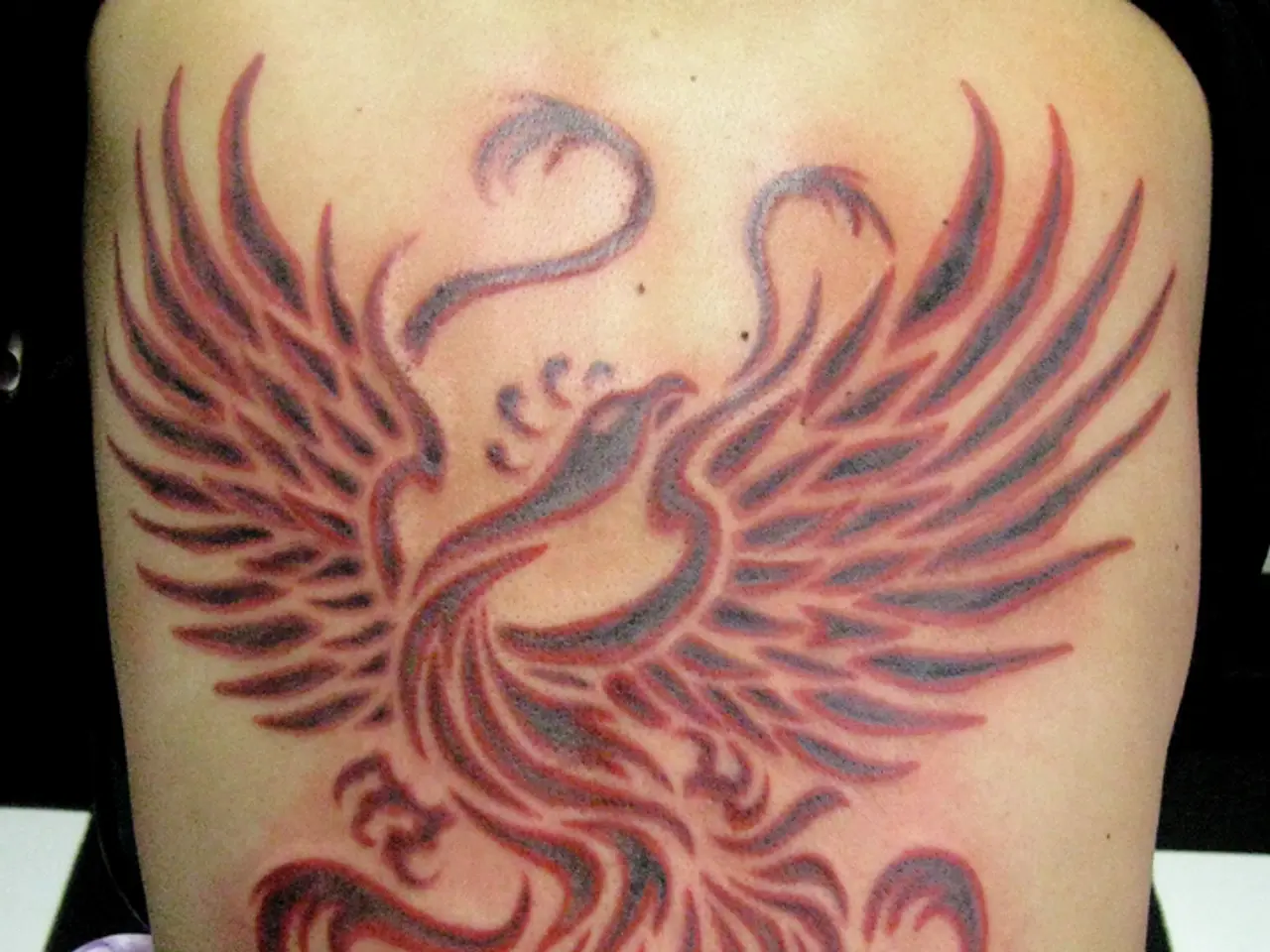Tattoo Imperfections: Reasons, Remedies, and Prevention Strategies
Tattoo pimples, a common concern for tattoo enthusiasts, can appear as raised, red bumps around a tattooed area. These unsightly bumps can be caused by various factors, including infections, allergic reactions, and improper aftercare during the healing process.
### Causes of Tattoo Pimples
Infections, caused by bacteria entering the tattooed skin before it fully heals, are one of the primary causes of tattoo pimples. Symptoms include redness, swelling, intense pain, pus, or hard bumpy tissue around the tattoo. An infected tattoo may also have increased warmth and discomfort, and if left untreated, could lead to fever and systemic symptoms.
Irritation and scabbing can also lead to the formation of bumps due to bodily fluid build-up and the skin's healing response. Allergic reactions to ink pigments, especially when exposed to sunlight or due to an immune response, can cause itchy, raised bumps. Underlying skin issues like acne or eczema can be aggravated by tattooing, sometimes causing pimples to develop. Environmental factors, such as excessive sweating, humidity, and sun exposure, can also irritate the tattoo and cause raised bumps and inflammation.
### How to Treat Tattoo Pimples
To treat tattoo pimples, it's essential to keep the area clean by gently washing it with mild soap and water 2-3 times daily to prevent bacterial growth. Avoid picking or scratching the pimples to prevent worsening infection and scarring. If an infection is suspected, a healthcare provider may prescribe antibiotics or medicated creams to reduce bacteria and inflammation. Keeping the tattoo moisturized with fragrance-free ointments and avoiding harsh chemicals or sun exposure helps healing.
For severe symptoms like spreading redness, pus, fever, or intense pain, prompt professional care is necessary.
### Prevention of Tattoo Pimples
Prevention is key in managing tattoo pimples. Following proper aftercare, such as cleaning, moisturizing, and avoiding friction or tight clothes on the tattoo, is crucial. Using clean equipment, maintaining good hygiene, and avoiding excessive sun exposure and sweating during healing help reduce the risk of irritation and infection. People with sensitive skin or allergies should discuss ink types with their tattoo artist beforehand to avoid allergic reactions.
In summary, tattoo pimples mainly result from infections or irritation during the healing phase. Proper hygiene, aftercare, and avoiding irritants are crucial for prevention and management. If pimples are accompanied by severe symptoms, see a healthcare professional promptly to avoid complications.
In addition to infections, allergic reactions to certain ink pigments, especially when exposed to sunlight or due to an immune response, can cause itchy, raised bumps on tattooed skin. Skin conditions like atopic disease, eczema, or psoriasis may be aggravated by tattooing, resulting in pimples. Hepatitis, an infectious liver disease, is not related to tattoo pimples but should be considered when planning a tattoo to ensure no transmission of the virus.
Macular degeneration, a type of age-related eye disease, is not connected to tattoo pimples, but maintaining good mental and physical health, such as through exercise and a health-and-wellness routine, can help prevent depression and other mental health issues that may affect overall well-being.
Sclerosis, a condition characterized by hardening of the skin or other body tissues, is not directly related to tattoo pimples, but proper tattoo care can help reduce the risk of complications and promote healing. Obesity, a medical condition involving excessive body weight, has no known direct connection to tattoo pimples; however, maintaining a healthy weight can improve overall health and contribute to faster tattoo healing.
There have been no reported cases of multiple sclerosis being caused by tattoo pimples. Multiple sclerosis is a chronic autoimmune disorder that affects the central nervous system, not the skin or tattooed areas. COPD, or chronic obstructive pulmonary disease, is a lung condition that does not manifest as tattoo pimples, but maintaining proper fitness-and-exercise routines can help manage symptoms and improve respiratory health.
Bipolar disorder, a mental health condition characterized by extreme mood swings, is not caused by tattoo pimples. Proper mental-health care, including therapy and medication, can help manage symptoms and improve overall well-being. Dryness in the skin, often due to factors like cold weather, can exacerbate tattoo pimples, but excessive dryness is unrelated to widespread skin conditions like dry eczema or dry dermatitis.
Diabetes, a chronic metabolic disorder characterized by high blood sugar levels, is not connected to tattoo pimples, but managing diabetes through diet, exercise, and medication can help maintain overall health and improve wound healing. Acne, a common skin condition characterized by pimples, is not directly caused by tattoo pimples, but proper skin care and avoiding irritants can help reduce breakouts in both cases.
Science continues to explore the potential connections between various health conditions and tattoo care. As research evolves, understanding the causes and effects of tattoo pimples and the related factors remains essential to ensuring proper tattoo care and promoting skin health. For health-conscious individuals focusing on their health-and-wellness, fitness-and-exercise, and mental-health routines, proper tattoo care and knowing the risks involved in getting a tattoo can help maintain overall well-being. Proper skin-care practices and consultation with healthcare professionals can help address tattoo pimples and potential underlying health issues effectively.




